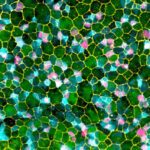Lien vers Pubmed [PMID] – 25145867
Eur. J. Neurosci. 2014 Nov;40(9):3302-15
The brain reward circuitry plays a key role in emotional and motivational behaviors, and its dysfunction underlies neuropsychiatric disorders such as schizophrenia, depression and drug addiction. Here, we characterized the neuronal activity pattern induced by acute amphetamine administration and during drug-seeking behavior in the zebrafish, and demonstrate the existence of conserved underlying brain circuitry. Combining quantitative analyses of cfos expression with neuronal subtype-specific markers at single-cell resolution, we show that acute d-amphetamine administration leads to both increased neuronal activation and the recruitment of neurons in the medial (Dm) and the lateral (Dl) domains of the adult zebrafish pallium, which contain homologous structures to the mammalian amygdala and hippocampus, respectively. Calbindin-positive and glutamatergic neurons are recruited in Dm, and glutamatergic and γ-aminobutyric acid (GABAergic) neurons in Dl. The drug-activated neurons in Dm and Dl are born at juvenile stage rather than in the embryo or during adulthood. Furthermore, the same territory in Dm is activated during both drug-seeking approach and light avoidance behavior, while these behaviors do not elicit activation in Dl. These data identify the pallial territories involved in acute psychostimulant response and reward formation in the adult zebrafish. They further suggest an evolutionarily conserved function of amygdala-like structures in positive emotions and motivated behavior in zebrafish and mammals.

